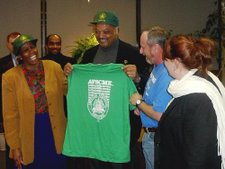
"At the turn of the century women earned approximately ten cents an hour, and men were fortunate to receive twenty cents an hour. The average work week was sixty to seventy hours. During the thirties, wages were a secondary issue; to have a job at all was the difference between the agony of starvation and a flicker of life. The nation, now so vigorous, reeled and tottered almost to total collapse. The labor movement was the principal force that transformed misery and despair into hope and progress. Out of its bold struggles, economic and social reform gave birth to unemployment insurance, old age pensions, government relief for the destitute, and above all new wage levels that meant not mere survival, but a tolerable life. The captains of industry did not lead this transformation; they resisted it until they were overcome. When in the thirties the wave of union organization crested over our nation, it carried to secure shores not only itself but the whole society."
Illinois AFL-CIO Convention, October 1965
"When there is massive unemployment in the black community, it is called a social problem. But when there is massive unemployment in the white community, it is called a Depression.
"We look around every day and we see thousands and millions of people making inadequate wages. Not only do they work in our hospitals, they work in our hotels, they work in our laundries, they work in domestic service, they find themselves underemployed. You see, no labor is really menial unless you're not getting adequate wages. People are always talking about menial labor. But if you're getting a good (wage) as I know that through some unions they've brought it up...that isn't menial labor. What makes it menial is the income, the wages."
Local 1199 Salute to Freedom, March 1968
"You are demanding that this city will respect the dignity of labor. So often we overlook the work and the significance of those who are not in professional jobs, of those who are not in the so-called big jobs. But let me say to you tonight that whenever you are engaged in work that serves humanity and is for the building of humanity, it has dignity and it has worth."
AFSCME Memphis Sanitation Strike, April 3, 1968
Photo: Dr. Martin Luther King, Jr. speaking in support of striking AFSCME sanitation workers at Mason Temple, Memphis, 4/3/68.





No comments:
Post a Comment